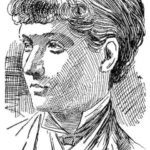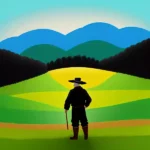 | |
Friend Barton’s “Concern” | |
| Author | Mary Hallock Foote |
|---|---|
| Published |
1888
|
| Language | English |
| Nationality | American |
| Genre | Historical Fiction, Western |
1888 Short Story
Friend Barton’s “Concern”
Friend Barton’s “Concern” is an English Historical Fiction, Western short story by American writer Mary Hallock Foote. It was first published in 1888.
Friend Barton’s “Concern”
by Mary Hallock Foote
It had been “borne in” upon him, more or less, during the long winter; it had not relaxed when the frosts unlocked their hold and the streams were set free from their long winter’s silence, among the hills. He grew restless and abstracted under “the turnings of the Lord’s hand upon him,” and his speech unconsciously shaped itself into the Biblical cadences which came to him in his moments of spiritual exercise.
The bedrabbled snows of March shrank away before the keen, quickening sunbeams; the hills emerged, brown and sodden, like the chrysalis of the new year; the streams woke in a tumult, and all day and night their voices called from the hills back of the mill: the waste-weir was a foaming torrent, and spread itself in muddy shallows across the meadow, beyond the old garden where the robins and bluebirds were house-hunting. Friend Barton’s trouble stirred with the life-blood of the year, and pressed upon him sorely; but as yet he gave it no words. He plodded about, among his lean kine, tempering the winds of March to his untimely lambs, and reconciling unnatural ewes to their maternal duties.
Friend Barton had never heard of the doctrine of the survival of the fittest, though it was the spring of 1812, and England and America were investigating the subject on the seas, while the nations of Europe were practically illustrating it. The “hospital tent,” as the boys called an old corn-basket, covered with carpet, which stood beside the kitchen chimney, was seldom without an occupant,–a brood of chilled chickens, a weakly lamb, or a wee pig (with too much blue in its pinkness), that had been left behind by its stouter brethren in the race for existence. The old mill hummed away through the day, and often late into the evening if time pressed, upon the grists which added a thin, intermittent stream of tribute to the family income. Whenever work was “slack,” Friend Barton was sawing or chopping in the woodshed adjoining the kitchen; every moment he could seize or make he was there, stooping over the rapidly growing pile.
“Seems to me, father, thee’s in a great hurry with the wood this spring. I don’t know when we’ve had such a pile ahead.”
“‘T won’t burn up any faster for being chopped,” Friend Barton said; and then his wife Rachel knew that if he had a reason for being “forehanded” with the wood, he was not ready to give it.
One rainy April afternoon, when the smoky gray distances began to take a tinge of green, and through the drip and rustle of the rain the call of the robins sounded, Friend Barton sat in the door of the barn, oiling the road-harness. The old chaise had been wheeled out and greased, and its cushions beaten and dusted.
An ox-team with a load of grain creaked up the hill and stopped at the mill door. The driver, seeing Friend Barton’s broad-brimmed drab felt hat against the dark interior of the barn, came down the short lane leading from the mill, past the house and farm-buildings.
“Fixin’ up for travelin’, Uncle Tommy?”
Vain compliments, such as worldly titles of Mr. and Mrs., were unacceptable to Thomas Barton, and he was generally known and addressed as “Uncle Tommy” by the world’s people of a younger generation.
“It is not in man that walketh to direct his own steps, neighbor Jordan. I am getting myself in readiness to obey the Lord, whichever way He shall call me.”
Farmer Jordan cast a shrewd eye over the premises. They wore that patient, sad, exhumed look which old farm-buildings are apt to have in early spring. The roofs were black with rain, and brightened with patches of green moss. Farmer Jordan instinctively calculated how many “bunches o’ shingle” would be required to rescue them from the decline into which they had fallen, indicated by these hectic green spots.
“Wal, the Lord calls most of us to stay at home and look after things, such weather as this. Good plantin’ weather; good weather for breakin’ ground; fust-rate weather for millin’! This is a reg’lar miller’s rain, Uncle Tommy. You’d ought to be takin’ advantage of it. I’ve got a grist back here; wish ye could manage to let me have it when I come back from store.”
The grist was ground and delivered before Friend Barton went in to his supper that night. Dorothy Barton had been mixing bread, and was wiping her white arms and hands on the roller towel by the kitchen door, as her father stamped and scraped his feet on the stones outside.
“There! I do believe I forgot to toll neighbor Jordan’s rye,” he said, as he gave a final rub on the broom Dorothy handed out to him. “It’s wonderful how careless I get!”
“Well, father, I don’t suppose thee’d ever forget, and toll a grist twice!”
“I believe I’ve been mostly preserved from mistakes of that kind,” said Friend Barton gently. “Well, well! To be sure,” he continued musingly. “It may be the Lord who stays my hand from gathering profit unto myself while his lambs go unfed.”
Dorothy put her hands on her father’s shoulders: she was almost as tall as he, and could look into his patient, troubled eyes.
“Father, I know what thee is thinking of, but do think long. It will be a hard year; the boys ought to go to school; and mother is so feeble!”
Friend Barton’s “concern” kept him awake that night. His wife watched by his side, giving no sign, lest her wakeful presence should disturb his silent wrestlings. The tall, cherry-wood clock in the entry measured the hours, as they passed, with its slow, dispassionate tick.
At two o’clock Rachel Barton was awakened from her first sleep of weariness by her husband’s voice, whispering heavily in the darkness.
“My way is hedged up! I see no way to go forward. Lord, strengthen my patience, that I murmur not, after all I have seen of thy goodness. I find daily bread is very desirable; want and necessity are painful to nature; but shall I follow Thee for the sake of the loaves, or will it do to forsake Thee in times of emptiness and abasement?”
There was silence again, and restless tossings and sighings continued the struggle.
“Thomas,” the wife’s voice spoke tremulously in the darkness, “my dear husband, I know whither thy thoughts are tending. If the Spirit is with thee, do not deny it for our sakes, I pray thee. The Lord did not give thee thy wife and children to hang as a millstone round thy neck. I am thy helpmeet, to strengthen thee in his service. I am thankful that I have my health this spring better than usual, and Dorothy is a wonderful help. Her spirit was sent to sustain me in thy long absences. Go, dear, and serve our Master, who has called thee in these bitter strivings! Dorothy and I will keep things together as well as we can. The way will open–never fear!” She put out her hand and touched his face in the darkness; there were tears on the furrowed cheeks. “Try to sleep, dear, and let thy spirit have rest. There is but one answer to this call.”
With the first drowsy twitterings of the birds, when the crescent-shaped openings in the board shutters began to define themselves clearly in the shadowy room, they arose and went about their morning tasks in silence. Friend Barton’s step was a little heavier than usual, and the hollows round his wife’s pale brown eyes were a little deeper. As he sat on the splint-bottomed chair by the kitchen fireplace, drawing on his boots, she placed her hands on his shoulders, and touched with her cheek the worn spot on the top of his head.
“Thee will lay this concern before meeting to-morrow, father?”
“I had it on my mind to do so,–if my light be not quenched before then.”
Friend Barton’s light was not quenched. Words came to him, without seeking,–a sure sign that the Spirit was with him,–in which to “open the concern” that had ripened in his mind, of a religious visit to the meeting constituting the yearly meetings of Philadelphia and Baltimore. A “minute” was given him, encouraging him in the name, and with the full concurrence, of the monthly meetings of Nine Partners and Stony Valley, to go wherever the Truth might lead him.
While Friend Barton was thus freshly anointed, and “abundantly encouraged,” his wife, Rachel, was talking with Dorothy, in the low upper chamber known as the “wheel-room.”
Dorothy was spinning wool on the big wheel, dressed in her light calico short gown and brown quilted petticoat; her arms were bare, and her hair was gathered away from her flushed cheeks and knotted behind her ears. The roof sloped down on one side, and the light came from a long, low window under the eaves. There was another window (shaped like a half-moon, high up in the peak), but it sent down only one long beam of sunlight, which glimmered across the dust and fell upon Dorothy’s white neck.
The wheel was humming a quick measure and Dorothy trod lightly back and forth, the wheel-pin in one hand, the other holding the tense, lengthening thread, which the spindle devoured again.
“Dorothy, thee looks warm: can’t thee sit down a moment, while I talk to thee?”
“Is it anything important, mother? I want to get my twenty knots before dinner.” She paused as she joined a long tress of wool at the spindle. “Is it anything about father?”
“Yes, it’s about father, and all of us.”
“I know,” said Dorothy, with a sigh. “He’s going away again!”
“Yes, dear. He feels that he is called. It is a time of trouble and contention everywhere: ‘the harvest,’ truly, ‘is plenteous, but the laborers are few.'”
“There are not so many ‘laborers’ here, mother, though to be sure, the harvest”–
“Dorothy, my daughter, don’t let a spirit of levity creep into thy speech. Thy father has striven and wrestled with his urgings. I’ve seen it working on him all winter. He feels, now, it is the Lord’s will.”
“I don’t see how he can be so sure,” said Dorothy, swaying gloomily to and fro against the wheel. “I don’t care for myself, I’m not afraid of work, but thee’s not able to do what thee does now, mother. If I have outside things to look after, how can I help thee as I should? And the boys are about as much dependence as a flock of barn swallows!”
“Don’t thee fret about me, dear; the way will open. Thy father has thought and planned for us. Have patience while I tell thee. Thee knows that Walter Evesham’s pond is small and his mill is doing a thriving business?”
“Yes, indeed, I know it!” Dorothy exclaimed. “He has his own share, and ours too, most of it!”
“Wait, dear, wait! Thy father has rented him the ponds, to use when his own gives out. He is to have the control of the water, and it will give us a little income, even though the old mill does stand idle.”
“He may as well take the mill, too. If father is away all summer it will be useless ever to start it again. Thee’ll see, mother, how it will end, if Walter Evesham has the custom and the water all summer. I think it’s miserable for a young man to be so keen about money.”
“Dorothy, seems to me thee’s hasty in thy judgments. I never heard that said of Walter Evesham. His father left him with capital to improve his mill. It does better work than ours; we can’t complain of that. Thy father was never one to study much after ways of making money. He felt he had no right to more than an honest livelihood. I don’t say that Walter Evesham’s in the wrong. We know that Joseph took advantage of his opportunities, though I can’t say that I ever felt much unity with some of his transactions. What would thee have, my dear? Thee’s discouraged with thy father for choosing the thorny way, which we tread with him; but thee seems no better satisfied with one who considers the flesh and its wants'”
“I don’t know, mother, what I want for myself; that doesn’t matter; but for thee I would have rest from all these cruel worries thee has borne so long.”
She buried her face in her mother’s lap and put her strong young arms about the frail, toil-bent form.
“There, there, dear. Try to rule thy spirit, Dorothy. Thee’s too much worked up about this. They are not worries to me. I am thankful we have nothing to decide one way or the other, only to do our best with what is given us. Thee’s not thyself, dear. Go downstairs and fetch in the clothes, and don’t hurry; stay out till thee gets more composed.”
Dorothy did not succeed in bringing herself into unity with her father’s call, but she came to a fuller realization of his struggle. When he bade them good-by his face showed what it had cost him; but Rachel was calm and cheerful. The pain of parting is keenest to those who go, but it stays longer with those that are left behind.
“Dorothy, take good care of thy mother!” Friend Barton said, taking his daughter’s face between his hands and gravely kissing her brow between the low-parted ripples of her hair.
“Yes, father,” she said, looking into his eyes; “Thee knows I’m thy eldest son.”
They watched the old chaise swing round the corner of the lane, then the pollard willows shut it from sight.
“Come, mother,” said Dorothy, hurrying her in at the gate. “I’m going to make a great pot of mush, and have it hot for supper, and fried for breakfast, and warmed up with molasses for dinner, and there’ll be some cold with milk for supper, and we shan’t have any cooking to do at all!”
They went around by the kitchen door. Rachel stopped in the woodshed, and the tears rushed to her eyes.
“Dear father! How he has worked over that wood, early and late, to spare us!”
We will not revive Dorothy’s struggles with the farm-work, and with the boys. They were an isolated family at the mill-house; their peculiar faith isolated them still more, and they were twelve miles from meeting and the settlement of Friends at Stony Valley. Dorothy’s pride kept her silent about her needs, lest they might bring reproach upon her father among the neighbors, who would not be likely to feel the urgency of his spiritual summons.
The summer heats came on apace and the nights grew shorter. It seemed to Dorothy that she had hardly stretched out her tired young body and forgotten her cares, in the low, attic bedroom, before the east was streaked with light and the birds were singing in the apple-trees, whose falling blossoms drifted in at the window.
One day in early June, Friend Barton’s flock of sheep (consisting of nine experienced ewes, six yearlings, and a sprinkling of close-curled lambs whose legs had not yet come into mature relations with their bodies) was gathered in a wattled inclosure, beside the stream that flowed into the mill-head. It was supplied by the waste from the pond, and, when the gate was shut, rambled easily over the gray slate pebbles, with here and there a fall just forcible enough to serve as a douche-bath for a well-grown sheep. The victims were panting in their heavy fleeces, and mingling their hoarse, plaintive tremolo with the ripple of the water and the sound of young voices in a frolic. Dorothy had divided her forces for the washing to the best advantage. The two elder boys stood in midstream to receive the sheep, which she, with the help of little Jimmy, caught and dragged to the bank.
The boys were at work now upon an elderly ewe, while Dorothy stood on the brink of the stream braced against an ash sapling, dragging forward by the fleece a beautiful but reluctant yearling. Her bare feet were incased in a pair of moccasins that laced around the ankle; her petticoats were kilted, and her broad hat bound down with a ribbon; one sleeve was rolled up, the other had been sacrificed in a scuffle in the sheep-pen. The new candidate for immersion stood bleating and trembling with her forefeet planted against the slippery bank, pushing back with all her strength while Jimmy propelled from the rear.
“Boys!” Dorothy’s clear voice called across the stream. “Do hurry! She’s been in long enough, now! Keep her head up, can’t you, and squeeze the wool hard! You’re not half washing! Oh, Reuby! thee’ll drown her! Keep her head up!”
Another unlucky douse and another half-smothered bleat,–Dorothy released the yearling and plunged to the rescue. “Go after that lamb, Reuby!” she cried with exasperation in her voice. Reuby followed the yearling, that had disappeared over the orchard slope, upsetting an obstacle in its path, which happened to be Jimmy. He was wailing now on the bank, while Dorothy, with the ewe’s nose tucked comfortably in the bend of her arm, was parting and squeezing the fleece, with the water swirling round her. Her stout arms ached, and her ears were stunned with the incessant bleatings; she counted with dismay the sheep still waiting in the pen. “Oh, Jimmy! Do stop crying, or else go to the house!”
“He’d better go after Reuby,” said Sheppard Barton, who was now Dorothy’s sole dependence.
“Oh yes, do, Jimmy, that’s a good boy. Tell him to let the yearling go and come back quick.”
The water had run low that morning in Evesham’s pond. He shut down the mill, and strode up the hills, across lots, to raise the gate of the lower Barton pond, which had been heading up for his use. He passed the cornfield where, a month before, he had seen pretty Dorothy Barton dropping corn with her brothers. It made him ache to think of Dorothy with her feeble mother, the boys as wild as preachers’ sons proverbially are, and the old farm running down on her hands; the fences all needed mending, and there went Reuben Barton, now, careering over the fields in chase of a stray yearling. His mother’s house was big, and lonely, and empty; and he flushed as he thought of the “one ewe-lamb” he coveted out of Friend Barton’s rugged pastures.
As Evesham raised the gate, and leaned to watch the water swirl and gurgle through the “trunk,” sucking the long weeds with it, and thickening with its tumult the clear current of the stream, the sound of voices and the bleating of sheep came up from below. He had not the farming instincts in his blood; the distant bleating, the hot June sunshine and cloudless sky did not suggest to him sheep-washing; but now came a boy’s voice shouting and a cry of distress, and he remembered with a thrill that Friend Barton used the stream for that peaceful purpose. He shut down the gate and tore along through the ferns and tangled grass till he came to the sheep-pen, where the bank was muddy and trampled. The prisoners were bleating drearily and looking with longing eyes across to the other side, where those who had suffered were now straying and cropping the short turf through the lights and shadows of the orchard.
There was no other sign of life, except a broad hat with a brown ribbon buffeted about in an eddy among the stones. The stream dipped now below the hill, and the current, still racing fast with the impetus he had given it, shot away amongst the hazel thickets that crowded close to the brink. He was obliged to make a detour by the orchard and to come out below at the “mill-head,” a black, deep pool with an ugly ripple setting across it to the head-gate. He saw something white clinging there, and ran round the brink. It was the sodden fleece of the old ewe, which had been drifted against the head-gate and held there to her death. Evesham, with a sickening contraction of the heart, threw off his jacket for a plunge, when Dorothy’s voice called rather faintly from the willows on the opposite bank.
“Don’t jump! I’m here,” she said. Evesham searched the willows and found her seated in the sun, just beyond, half buried in a bed of ferns.
“I shouldn’t have called thee,” she said shyly, as he sank pale and panting beside her, “but thee looked–I thought thee was going to jump into the mill-head!”
“I thought you were there, Dorothy!”
“I was there quite long enough. Shep pulled me out; I was too tired to help myself much.” Dorothy held her palm pressed against her temple and the blood trickled from beneath, streaking her pale, wet cheek.
“He’s gone to the house to get me a cloak. I don’t want mother to see me, not yet,” she said.
“I’m afraid you ought not to wait, Dorothy. Let me take you to the house, won’t you? I’m afraid you’ll get a deadly chill.”
Dorothy did not look in the least like death. She was blushing now, because Evesham would think it so strange of her to stay, and yet she could not rise in her wet clothes, that clung to her like the calyx to a bud.
“Let me see that cut, Dorothy!”
“Oh, it’s nothing. I don’t wish thee to look at it!”
“But I will! Do you want to make me your murderer, sitting there in your wet clothes with a cut on your head?”
He drew away her hand; the wound, indeed, was no great affair, but he bound it up deftly with strips of his handkerchief. Dorothy’s wet curls touched his fingers and clung to them, and her eyelashes drooped lower and lower.
“I think it was very stupid of thee. Didn’t thee hear us from the dam? I’m sure we made noise enough.”
“Yes, I heard you when it was too late. I heard the sheep before, but how could I imagine that you, Dorothy, and three boys as big as cockerels, were sheep-washing? It’s the most preposterous thing I ever heard of!”,
“Well, I can’t help being a woman, and the sheep had to be washed. I think there ought to be more men in the world when half of them are preaching and fighting.”
“If you’d only let the men who are left help you a little, Dorothy.”
“I don’t want any help. I only don’t want to be washed into the mill-head.”
They both laughed, and Evesham began again entreating her to let him take her to the house.
“Hasn’t thee a coat or something I could put around me until Shep comes?” said Dorothy. “He must be here soon.”
“Yes, I’ve a jacket here somewhere.”
He sped away to find it, and faithless Dorothy, as the willows closed between them, sprang to her feet and fled like a startled Naiad to the house.
When Evesham, pushing through the willows, saw nothing but the bed of wet, crushed ferns and the trail through the long grass where Dorothy’s feet had fled, he smiled grimly to himself, remembering that “ewe-lambs” are not always as meek as they look.
That evening Rachel had received a letter from Friend Barton and was preparing to read it aloud to the children. They were in the kitchen, where the boys had been helping Dorothy in a desultory manner to shell corn for the chickens; but now all was silence while Rachel wiped her glasses and turned the large sheet of paper, squared with many foldings, to the candle.
She read the date, “‘London Grove, 5th month, 22d.–Most affectionately beloved.'” “He means us all,” said Rachel, turning to the children with a tender smile. “It’s spelled with a small b.”
“He means thee!” said Dorothy, laughing. “Thee’s not such a very big beloved.”
There was a moment’s silence. “I don’t know that the opening of the letter is of general interest,” Rachel mused, with her eyes traveling slowly down the page. “He says: ‘In regard to my health, lest thee should concern thyself, I am thankful to say I have never enjoyed better since years have made me acquainted with my infirmities of body, and I earnestly hope that my dear wife and children are enjoying the same blessing.
“‘I trust the boys are not deficient in obedience and helpfulness. At Sheppard’s age I had already begun to take the duties of a man upon my shoulders.'”
Sheppard giggled uncomfortably, and Dorothy laughed outright.
“Oh, if father only knew how good the boys are! Mother, thee must write and tell him about their ‘helpfulness and obedience’! Thee can tell him their appetites keep up pretty well; they manage to take their meals regularly, and they are always out of bed by eight o’clock to help me hang up the milking-stool!”
“Just wait till thee gets into the mill-head again, Dorothy Barton! Thee needn’t come to me to help thee out!”
“Go on, mother. Don’t let the boys interrupt thee!”
“Well,” said Rachel, rousing herself, “where was I? Oh, ‘At Sheppard’s age’! Well, next come some allusions to the places where he has visited and his spiritual exercises there. I don’t know that the boys are quite old enough to enter into this yet. Thee’d better read it thyself, Dorothy. I’m keeping all father’s letters for the boys to read when they are old enough to appreciate them.”
“Well, I think thee might read to us about where he’s been preachin’. We can understand a great deal more than thee thinks we can,” said Shep in an injured voice. “Reuby can preach some himself. Thee ought to hear him, mother. It’s almost as good as meetin’.”
“I wondered how Reuby spent his time,” said Dorothy, and the mother hastened to interpose.
“Well! here’s a passage that may be interesting: ‘On sixth day attended the youths’ meeting here, a pretty favored time on the whole. Joseph’ (that’s Joseph Carpenter; he mentions him aways back) ‘had good service in lively testimony, while I was calm and easy without a word to say. At a meeting at Plumstead we suffered long, but at length we felt relieved. The unfaithful were admonished, the youth invited, and the heavy-hearted encouraged. It was a heavenly time.’ Heretofore he seems to have been closed up with silence a good deal, but now the way opens continually for him to free himself. He’s been ‘much favored,’ he says, ‘of late.’ Reuby, what’s thee doing to thy brothers?” (Shep and Reuby, who had been persecuting Jimmy by pouring handfuls of corn down the neck of his jacket until he had taken refuge behind Dorothy’s chair, were now recriminating with corn-cobs on each other’s faces.) “Dorothy, can’t thee keep those boys quiet?”
“Did thee ever know them to be quiet?” said Dorothy, helping Jimmy to relieve himself of his corn.
“Well now, listen.” Rachel continued placidly, “‘Second day, 27th’ (of fifth month, he means; the letter’s been a long time coming), ‘attended their mid-week meeting at London Grove, where my tongue, as it were, clave to the roof of my mouth, while Hannah Husbands was much favored and enabled to lift up her voice like the song of an angel'”–
“Who’s Hannah Husbands?” Dorothy interrupted.
“Thee doesn’t know her, dear. She was second cousin to thy father’s stepmother; the families were not congenial, I believe, but she has a great gift for the ministry.”
“I should think she’d better be at home with her children, if she has any. Fancy thee, mother, going about to strange meetings and lifting up thy voice”–
“Hush, hush, Dorothy! Thy tongue’s running away with thee. Consider the example thee’s setting the boys.”
“Thee’d better write to father about Dorothy, mother. Perhaps Hannah Husbands would like to know what she thinks about her preachin’.”
“Well, now, be quiet, all of you. Here’s something about Dorothy: ‘I know that my dear daughter Dorothy is faithful and loving, albeit somewhat quick of speech and restive under obligation. I would have thee remind her that an unwillingness to accept help from others argues a want of Christian Meekness. Entreat her from me not to conceal her needs from our neighbors, if so be she find her work oppressive. We know them to be of kindly intention, though not of our way of thinking in all particulars. Let her receive help from them, not as individuals, but as instruments of the Lord’s protection, which it were impiety and ingratitude to deny.'”
“There!” cried Shep. “That means thee is to let Luke Jordan finish the sheep-washing. Thee’d better have done it in the first place. We shouldn’t have the old ewe to pick if thee had.”
Dorothy was dimpling at the idea of Luke Jordan in the character of an instrument of heavenly protection. She had not regarded him in that light, it must be confessed, but had rejected him with scorn.
“He may, if he wants to,” she said; “but you boys shall drive them over. I’ll have nothing to do with it.”
“And shear them too, Dorothy? He asked to shear them long ago.”
“Well, let him shear them and keep the wool too.”
“I wouldn’t say that, Dorothy,” said Rachel Barton. “We need the wool, and it seems as if over-payment might not be quite honest, either.”
“Oh, mother, mother! What a mother thee is!” cried Dorothy laughing and rumpling Rachel’s cap-strings in a tumultuous embrace.
“She’s a great deal too good for thee, Dorothy Barton.”
“She’s too good for all of us. How did thee ever come to have such a graceless set of children, mother?”
“I’m very well satisfied,” said Rachel. “But now do be quiet and let’s finish the letter. We must get to bed some time to-night!”
* * * * *
The wild clematis was in blossom now; the fences were white with it, and the rusty cedars were crowned with virgin wreaths; but the weeds were thick in the garden and in the potato patch. Dorothy, stretching her cramped back, looked longingly up the shadowy vista of the farm-lane that had nothing to do but ramble off into the remotest green fields, where the daisies’ faces were as white and clear as in early June.
One hot August night she came home late from the store. The stars were thick in the sky; the katydids made the night oppressive with their rasping questionings, and a hoarse revel of frogs kept the ponds from falling asleep in the shadow of the hills.
“Is thee very tired to-night, Dorothy?” her mother asked, as she took her seat on the low step of the porch. “Would thee mind turning old John out thyself?”
“No, mother, I’m not tired. But why? Oh, I know!” cried Dorothy with a quick laugh. “The dance at Slocum’s barn. I thought those boys were uncommonly helpful.”
“Yes, dear, it’s but natural they should want to see it. Hark! we can hear the music from here.”
They listened, and the breeze brought across the fields the sound of fiddles and the rhythmic tramp of feet, softened by the distance. Dorothy’s young pulses leaped.
“Mother, is it any harm for them just to see it? They have so little fun, except what they get out of teasing and shirking.”
“My dear, thy father would never countenance such a scene of frivolity, or permit one of his children to look upon it; through our eyes and ears the world takes possession of our hearts.”
“Then I’m to spare the boys this temptation, mother? Thee will trust me to pass the barn?”
“I would trust my boys, if they were thy age, Dorothy; but their resolution is tender like their years.”
It might be questioned whether the frame of mind in which the boys went to bed that night under their mother’s eye, for Rachel could be firm in a case of conscience, was more improving than the frivolity of Slocum’s barn.
“Mother,” called Dorothy, looking in at the kitchen window where Rachel was stooping over the embers in the fireplace to light a bedroom candle, “I want to speak to thee.”
Rachel came to the window, screening the candle with her hand.
“Will thee trust me to look at the dancing a little while? It is so very near.”
“Why, Dorothy, does thee want to?”
“Yes, mother, I believe I do. I’ve never seen a dance in my life. It cannot ruin me to look just once.”
Rachel stood puzzled.
“Thee’s old enough to judge for thyself, Dorothy. But, my child, do not tamper with thy inclinations through heedless curiosity. Thee knows thee’s more impulsive than I could wish for thy own peace.”
“I’ll be very careful, mother. If I feel in the least wicked I will come straight away.”
She kissed her mother’s hand that rested on the window-sill. Rachel did not like the kiss, nor Dorothy’s brilliant eyes and flushed cheeks, as the candle revealed them like a fair picture painted on the darkness. She hesitated, but Dorothy sped away up the lane with old John lagging at his halter.
Was it the music growing nearer that quickened her breathing, or only the closeness of the night shut in between the wild grapevine curtains swung from one dark cedar column to another? She caught the sweetbrier’s breath as she hurried by, and now a loop in the leafy curtain revealed the pond, lying black in a hollow of the hills with a whole heaven of stars reflected in it. Old John stumbled along over the stones, cropping the grass as he went. Dorothy tugged at his halter and urged him on to the head of the lane







